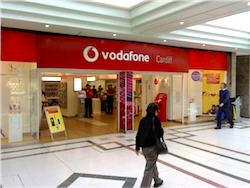Vodafone Germany has announced a network access agreement with Deutsche Telekom, which will enable Vodafone to offer high-speed fixed line broadband and IPTV services to German subscribers using DT’s new vectoring technology.
While Vodafone has had wholesale network agreements with the German operator before and currently has 20,000 DSL customers, the new agreement enables Vodafone to piggyback onto DT’s VDSL broadband network under a bespoke “Layer 3” IP-based bitstream agreement.
Initially Vodafone will be able to offer subscribers on-demand and broadcast IPTV services with speeds of up to 50 Mbps, but the speed will double once DT introduces vectoring technology onto the network.
Vectoring is a type of noise-cancelling technology that removes interference on VDSL lines, boosting signals on the copper cables
“Once DT have introduced vectoring, the IPTV speeds we can offer will come up to 100Mbps and we can tailor our own services to sell for broadband and IPTV direct to consumers and enterprise customers,” Simon Gordon, spokesperson for Vodafone Group told Mobile Europe.
Under the second part of the agreement, DT will also provide Vodafone with a more advanced “Layer 2” ethernet-based bitstream, which will give Vodafone better geographical coverage in Germany.
“What will give us greater capacity is when we move up to Layer 2, which takes the point of presence closer to the customer premises. At the moment there’s a restriction on the number of houses you can offer the service to without degrading the quality,” said Gordon.
“We had local loop on bundling in Germany, a bit of fixed line through Arcor, but it’s a small network compared to DT. This will enable us to put our own kit in the cabinets of the fixed players.”
DT currently provides super-fast VDSL broadband to 12 million households in Germany, with the aim to expand this to 24 million households by 2016.
Vodafone is seeking to expand its unified communications services across European enterprise and consumer markets.
“We have a three-pronged approach to offering unified services,” said Gordon. “We either partner with other operators, co-invest or buy a company.
“In Germany we partnered, in Spain we co-invested with Orange to build a new fibre network, and in the UK we bought CWW last year to allow us to offer services to enterprise customers, while in Italy we have a wholesale contract with Metroweb, allowing us to offer services to consumers in Milan.
“In European countries, we have different approaches depending on the market.”



